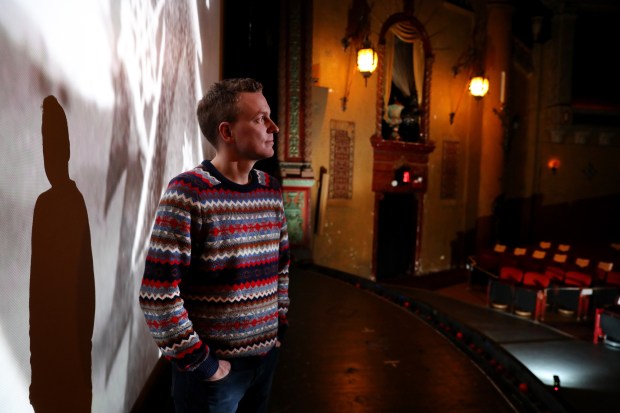Of all the Music Box Theatre’s pertinent attributes — the breadth of the programming; the atmospheric appeal of the main auditorium, lobby and adjoining lounge; the wine at the bar, direct from Dablon Winery and Vineyards, owned by William Schopf, theater owner and president and founder of Music Box Films — the theater seats are dead last.
They’re not attributes at all, really. They’re more like placeholders for the seats you wish they had. In a word: tough. They’re tough on the hindquarters. Noisy, too. You even think about shifting your weight during a screening, and the seat intuits your intentions and commences to squeaking before you actually make a move.
But changes are coming, all 740 of them.
Following the Aug. 11 presentation of the Lakeview theater’s final 70 MM Film Festival attraction, the theater’s main venue closes its grand, slightly careworn doors for a $750,000 renovation including new seats, new carpeting, new lighting and replastering, repair and general spiffing-up of the proscenium arch framing the screen. (The smaller one will remain open.)
Reopening is scheduled to reopen on Sept. 6 in time for the annual Noir City festival, hosted by Eddie Muller of Turner Classic Movies and the nonprofit Film Noir Foundation.
Here’s some intel on what’s coming soon.
THE SEATS: “Yes, I sat in them,” Music Box general manager Ryan Oestreich told me. “The Irwin Seating Company of Walker, Michigan, sent us a sample. What people want is support, and a nice, level seat that folds up without making noise. And cup holders! Now we’ll have cupholders. It’s ridiculous we’ve gone this long without them.” All but 34 of the 740 new seats will have them.
THE ARMRESTS: “Wooden armrests, really nice wood. We’re trying to maintain the historic atmosphere of the room, and we picked out seats that do that.” Plus you can …
SPONSOR A SEAT: If your ego’s telling you “put your name, someone’s else’s name” on a nice shiny tiny metal plate on a nice new armrest on a nice new Music Box Theatre seat, you can do it. Name of a business, your movie-loving grandparents, whatever. It’s $750 for one seat, $1,400 for a pair; more at revive.musicboxtheatre.com
UNDER YOUR FEET: This summer’s renovations include patching the problematic areas of the theater’s concrete floor with a new epoxy coating. “Paint doesn’t work,” Oestreich says. “When you paint floors you get a five-, maybe 10-year lifespan on the job. We’re applying this industrial grade epoxy with a 25-year life. Grippier surface, too, which is better for safety and easier to clean.” New carpet, too; design to be determined (the staff is still assessing samples), but if the Music Box Theatre is essentially a period picture unto itself, the carpet, Oestreich says, needs to complement the period.
THE ARCH: The proscenium arch framing the Music Box stage, and the screen dominating it, needs new plaster, which means scaffolding, which is a big reason for the nearly month-long shutdown of the big venue. Plus a sponge-cleaning once the plaster work is done.
THE RATIONALE: “Each year since 2016,” Oestreich says, “we’ve invested anywhere from $250,000 to $300,000 back into the building. The bathrooms, the marquee (replaced in 2017, originally estimated at $250,000, eventually costing $400,000), new roof, new AC unit for the main theater, all of it. It’s expensive. And it’s a risk, closing down the main theater for a month. It’s our main revenue generator.” And that, Oestreich says, is why they’re finding ways to get Music Box loyalists to pitch in and get something for it.
SEATS FOR SALE: The theater’s working with the nonprofit Rebuild Exchange to yank out, lovingly, the current, variously worn, uneven, slightly lumpy seats, some aisle seats equipped with remnants of the original 1929 brass accents. They’re selling them to general public, in sets of two or four. Details to come. There are other ways to give back go the venue and its makeover. Donate $100 or more and you get the movie poster of your choice, from the Music Box’s 22-year-old archive.
“We’re able to make these renovations because of the community built around this place,” Oestreich says. “And we have a supportive owner. Without those two components, we wouldn’t be here today.”
Michael Phillips is a Tribune critic.





